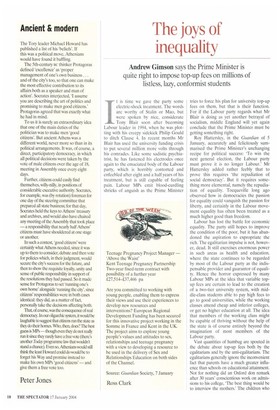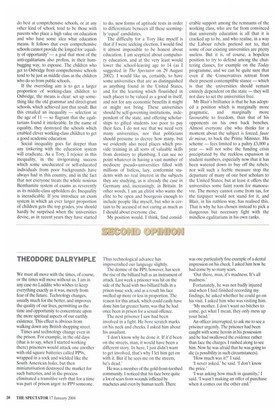The joys of inequality
Andrew Gim son says the Prime Minister is quite right to impose top-up fees on millions of listless, lazy, conformist students
It is time we gave the party some electric-shock treatment. The words are worthy of Stalin or Mao, but were spoken by nice, considerate Tony Blair soon after becoming Labour leader in 1994, when he was plotting with his creepy sidekick Philip Gould to ditch Clause 4. In recent months Mr Blair has used the university funding crisis to put several million more volts through his comrades. Like some sadistic psychiatrist, he has fastened his electrodes once again to the emaciated body of the Labour party, which is horribly contorted and enfeebled after eight and a half years of his treatment, but is still capable of feeling pain. Labour MPs emit blood-curdling shrieks of anguish as the Prime Minister
Teenage Pregnancy Project Manager — 'Above the Waist' Kent Teenage Pregnancy Partnership Two-year fixed-term contract with possibility of a further year f27,514—£37,466 pa Are you committed to working with young people, enabling them to express their views and use their experiences to develop new resources and interventions? European Regional Development Funding has been secured for this innovative project working in the Somme in France and Kent in the UK. The project aims to explore young people's values and attitudes to sex, relationships and teenage pregnancy with a view to developing a resource to be used in the delivery of Sex and Relationships Education on both sides of the Channel. tries to force his plan for university top-up fees on them, but that is their function. For if the Labour party regards what Mr Blair is doing as yet another betrayal of socialism, middle England will yet again conclude that the Prime Minister must be getting something right.
Roy Hattersley, in the Guardian of 5 January, accurately and felicitously summarised the Prime Minister's unchanging recipe for political success: 'To win the next general election, the Labour party must prove it is no longer Labour.' Mr Hattersley added rather feebly that to prove this requires 'the repudiation of social democracy'. But it requires something more elemental, namely the repudiation of equality. Tocqueville long ago observed how in democracies the passion for equality could vanquish the passion for liberty, and certainly in the Labour movement equality has often been treated as a much higher good than freedom.
Labour has lost the battle for economic equality. The party still hopes to improve the condition of the poor, but it has abandoned the aspiration to expropriate the rich. The egalitarian impulse is not, however, dead. It still exercises enormous power in such areas as health and education, where the state continues to be regarded by most of the Labour party as the indispensable provider and guarantor of equality. Hence the horror expressed by many Labour MPs at the idea that variable topup fees are certain to lead to the creation of a two-tier university system, with middle-class students able to pay high fees to go to good universities, while the working classes attend cheap and inferior colleges, or get no higher education at all. The idea that members of the working class might be capable of thriving without the help of the state is of course entirely beyond the imagination of most members of the Labour party.
Vast quantities of humbug are spouted in the debate about top-up fees both by the egalitarians and by the anti-egalitarians. The egalitarians generally ignore the inconvenient fact that parents have a much greater influence than schools on educational attainment. Not for nothing did an Oxford don remark after 30 years' conscientious work on admissions to his college, 'The best thing would be to interview the mothers.' The children who do best at comprehensive schools, or at any other kind of school, tend to be those with parents who place a high value on education and who have some idea what education means. It follows that even comprehensive schools cannot provide the longed for 'equality of opportunity' — a goal that most of the anti-egalitarians also profess, in their humbugging way, to espouse. The children who get to Oxbridge from comprehensive schools tend to be just as middle class as the children who do so from public schools.
If the overriding aim is to get a larger proportion of working-class children to Oxbridge, the means is clear: set up something like the old grammar and direct-grant schools, which achieved just that result. But this entailed an inequality — selection at the age of 11 — so flagrant that the egalitarians found it intolerable. In the name of equality, they destroyed the schools which enabled clever working-class children to get a good academic education.
Social inequality goes far deeper than any tinkering with the education system will eradicate. As a Tory, I rejoice in this inequality, in the invigorating success which some uneducated or self-educated individuals from poor backgrounds have always had in this country, and in the fact that not everyone treats the whole noxious Benthamite system of exams as reverently as its middle-class upholders do. Inequality is ineradicable. If you introduce an exam system in which an ever larger proportion of children gets the top grades, you should hardly be surprised when the universities devise, as in recent years they have started to do, new forms of aptitude tests in order to differentiate between all these seemingly 'equal' candidates.
The difficulty for a Tory like myself is that if I were seeking election, I would find it almost impossible to be honest about education. I am sceptical about compulsory education, and at the very least would lower the school-leaving age to 14 (as I suggested in The Spectator on 29 August 2002). I would like us, certainly, to have some universities that are as distinguished as anything found in the United States, and for the learning which flourished in such places to be valued as a good in itself, and not for any economic benefits it might or might not bring. These universities should be self-governing institutions, independent of the state, and offering scholarships to gifted students too poor to pay their fees. I do not see that we need very many universities, nor that politicians should presume to decree how many, but we evidently also need places which provide training in all sorts of valuable skills from dentistry to plumbing. I can see no point whatever in having a vast number of mediocre pseudo-universities filled with millions of listless, lazy, conformist students with no real interest in the subjects they are studying, as is already the case in Germany and, increasingly, in Britain. In other words, I am an elitist who wants the elite to be open and bourgeois enough to include people like myself, but who is certain to be accused of not caring as much as I should about everyone else.
My position would, I think, find consid
erable support among the remnants of the working class, who are far from convinced that university education is all that it is cracked up to be, and who realise, in a way the Labour rebels pretend not to, that some of our existing universities are pretty useless. But it is, of course, a hopeless position to try to defend among the chattering classes, for example on the Today programme, and we can be quite sure that even if the Conservatives retreat from their present contemptible stance — which is that the universities should remain entirely dependent on the state — they will not dare to set the universities free.
Mr Blair's brilliance is that he has adopted a position which is marginally more pragmatic, and marginally more favourable to freedom, than that of his opponents on his own back benches. Almost everyone else who thinks for a moment about the subject is forced, faute de mieux, to back the Prime Minister. His scheme — fees limited to a paltry /3,000 a year — will not solve the funding crisis precipitated by the reckless expansion in student numbers, especially now that it has been watered down to buy off the rebels; nor will such a feeble measure stop the departure of many of our best scholars to the United States; but at least it offers the universities some faint room for manoeuvre. The money cannot come from tax, for the taxpayer would not stand for it, and Blair, in his ruthless way, has realised this. That is why he has chosen instead to pick a dangerous but necessary fight with the mindless egalitarians in his own ranks.



































































 Previous page
Previous page